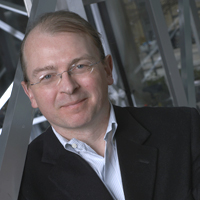Abstract: The use of quantum-mechanically entangled light to illuminate objects can provide significant enhancements over unentangled light for detecting and imaging those objects in the presence of high levels of noise and loss. Each signal sent out is entangled with an ancilla, which is retained. Detection takes place via an entangling measurement on the returning signal together with the ancilla. This talk shows that for photodetection, quantum illumination with m bits of entanglement can in increase the effective signal-to-noise ratio by a factor of 2^m, an exponential improvement over unentangled illumination. The enhancement persists even when noise and loss are so great that no entanglement survives at the detector.
Biography: Dr. Lloyd received a Ph.D. in Physics from Rockefeller University, under the supervision of Professor Heinz Pagels.
Dr. Lloyd was a postdoctoral fellow in the High Energy Physics Department at the California Institute of Technology, where he worked with Professor Murray Gell-Mann on applications of information to quantum-mechanical systems. He was a postdoctoral fellow at Los Alamos National Laboratory, where he worked at the Center for Nonlinear Systems on quantum computation. Since 1988, Dr. Lloyd has also been an adjunct faculty member at the Santa Fe Institute.
Dr. Lloyd is a principal investigator at the Research Laboratory of Electronics. He has performed seminal work in the fields of quantum computation and quantum communications, including proposing the first technologically feasible design for a quantum computer, demonstrating the viability of quantum analog computation, proving quantum analogs of Shannon's noisy channel theorem, and designing novel methods for quantum error correction and noise reduction.
Professor Lloyd is a member of the American Physical Society and the American Society of Mechanical Engineers.

